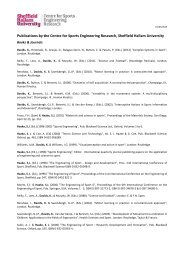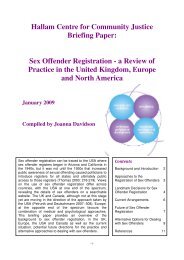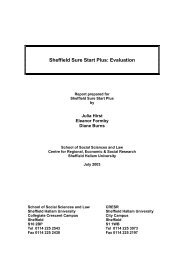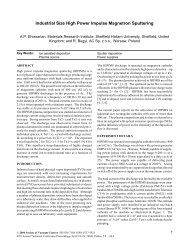The exercise of judicial discretion in rent arrears cases - Sheffield ...
The exercise of judicial discretion in rent arrears cases - Sheffield ...
The exercise of judicial discretion in rent arrears cases - Sheffield ...
Create successful ePaper yourself
Turn your PDF publications into a flip-book with our unique Google optimized e-Paper software.
<strong>The</strong>se quantitative f<strong>in</strong>d<strong>in</strong>gs reflect the qualitative experience <strong>of</strong> observation. <strong>The</strong><br />
researchers remarked on the difference made by the district judge to the atmosphere and<br />
proceed<strong>in</strong>gs <strong>in</strong> the court room. This too was the experience <strong>of</strong> focus group participants. For<br />
example, one district judge at London court was regarded as be<strong>in</strong>g “quite aggressive<br />
towards landlords”. If there was any problem with the paperwork, (e.g. where the claimant<br />
had forgotten to delete one <strong>of</strong> the options on the court forms, or was unsure who had served<br />
the notice), this judge would simply refuse to hear the case and ask the claimant how they<br />
wanted to progress. In particular, this judge was concerned to ensure that the claimants had<br />
done everyth<strong>in</strong>g they could to contact the defendants.<br />
Qualitative <strong>in</strong>terviews were conducted with three <strong>of</strong> the district judges and one deputy district<br />
judge observed <strong>in</strong> this court. <strong>The</strong>se also demonstrated that differences existed <strong>in</strong> the<br />
practice between the judges. <strong>The</strong>re were clear differences between them on questions <strong>of</strong><br />
procedure and substance. For example, three <strong>in</strong>terviewees preferred oral evidence,<br />
whereas one preferred it <strong>in</strong> writ<strong>in</strong>g. One district judge made clear that he had a slid<strong>in</strong>g scale<br />
<strong>of</strong> the evidence required depend<strong>in</strong>g on the order requested, whereas the others varied on<br />
whether they consciously had a mental checklist <strong>of</strong> the evidence they required to see. In<br />
addition the degree <strong>of</strong> attention given to the defendant’s behaviour was diffe<strong>rent</strong>. When<br />
asked whether the defendant’s behaviour <strong>in</strong> court affected the outcome, a range <strong>of</strong><br />
responses was given from these <strong>in</strong>terviewees:<br />
“I do very much try to take <strong>in</strong>to account that people do get nervous, that it is a huge<br />
issue for them, it’s their home and they can’t be...there isn’t much that’s<br />
more…worry<strong>in</strong>g than los<strong>in</strong>g your home. And to try and understand and remember<br />
that some people…become aggressive, some people become quiet, some people<br />
laugh when they’re under stress, and I try to factor that <strong>in</strong>.” (DJ E)<br />
“I th<strong>in</strong>k with the demeanour and attitude <strong>of</strong> the tenant and what they say and the<br />
impression you form <strong>of</strong> them does actually have quite a bear<strong>in</strong>g, yes. I can’t pretend<br />
otherwise.” (DJ J)<br />
As regards the substance, it was noticeable that, although there was conformity <strong>in</strong> their<br />
answers to a number <strong>of</strong> the scenarios <strong>in</strong>cluded <strong>in</strong> the <strong>in</strong>terview, some did elicit diffe<strong>rent</strong><br />
responses. For example, <strong>in</strong> answer<strong>in</strong>g the variant to question 1 (see Appendix 2) where the<br />
tenant’s <strong>arrears</strong> were £495, two <strong>in</strong>terviewees would have granted an outright order, and two<br />
would have granted a suspended possession order:<br />
“As long as I’m satisfied that they’d done everyth<strong>in</strong>g they can and that by adjourn<strong>in</strong>g<br />
it there’s noth<strong>in</strong>g else they can do.” (DJ E)<br />
“I would probably still make an outright order, but bear<strong>in</strong>g <strong>in</strong> m<strong>in</strong>d that presumably<br />
this is a case where there is still go<strong>in</strong>g to be <strong>discretion</strong> to suspend the warrant, so<br />
that's sort <strong>of</strong> a fall-back. You can make an outright order, hop<strong>in</strong>g that if he has got<br />
35
















